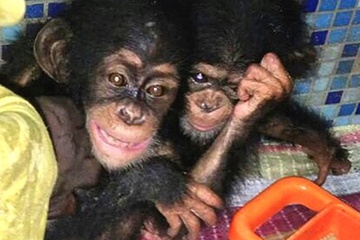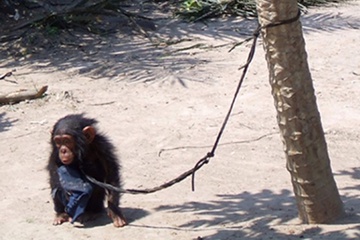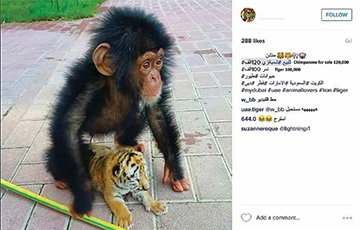by Ruby Vise
At PASA, you could say we love primates a bit more than average – that’s why we aim to protect them. Our love and admiration for great apes and monkeys inspires us to give them the best life possible. But even though we love primates, we would never keep one as a pet. You see, keeping a primate in your home may seem like an adventure, but once you’ve seen firsthand the horror and implications of the pet trade, that adventure quickly becomes a nightmare.
Primates kept as pets will never be able to live a normal life. They are either stolen from the wild or bred in captivity in inhumane conditions. A baby chimp should receive 24/7 care from its mother, usually spending the first 5 years of its life nursing. Without this critical contact time, primates fail to pick up natural behaviors, and they may even develop aggressive or fearful ones. Whether they are torn from their mothers by a poacher or by an impatient breeder, these orphans are deprived the familial bond they deserve, and they pay the price for the rest of their lives.
Despite the initial workload of raising a primate, the hard part comes when they reach sexual maturity. For smaller monkeys, this occurs around 18 to 24 months of age, while chimpanzees mature at around seven years of age. At this point, the animal you felt was part of your family will likely become aggressive and territorial. In an effort to contain adult primate pets, owners often resort to locking them in a tiny cage, having their teeth surgically removed, forcing them to wear shock collars, or even beating them. When these tactics fail to control their adult primate, owners are forced to give up the animal or risk their safety.
It is all too common for pet primates to develop malnutrition, physical deformities, and psychological issues. They experience severe trauma that can ruin their chances of living happily with others of their kind. Traumatized primates require specialized care from qualified professionals if they are ever going to be integrated into a social group. Sanctuaries all over the world are overflowing with surrendered primates. Often, people surrender their primate pet to a breeder, roadside zoo, or medical testing facility simply because they can’t find anywhere else.
No primate should be forced to live chained to a wall unable to even imagine the feeling of grass under their feet or the warmth of the sun on their face. The abuse and neglect must end. Awareness is the key to ending their suffering and changing their future. Stand up for the voiceless today by signing PASA’s petition to end the illegal sale of primates through social media. At PASA, we believe every voice counts – that’s why we are asking you to join our movement!

Chimps for sale via social media.

Pet primates are cut off from social ties that are so important to their health.

There is no easy way to flag animal cruelty on most social media platforms.
